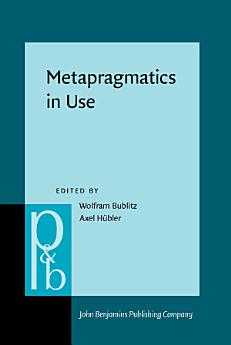Metapragmatics in Use
Wolfram Bublitz · Axel Hübler
ธ.ค. 2007 · Pragmatics & Beyond New Series หนังสือเล่มที่ 165 · John Benjamins Publishing
eBook
301
หน้า
reportคะแนนและรีวิวไม่ได้รับการตรวจสอบยืนยัน ดูข้อมูลเพิ่มเติม
เกี่ยวกับ eBook เล่มนี้
This collection of papers fills a gap in current research on both metapragmatics and pragmatics in that it combines data-based pragmatic analysis with metapragmatic theory and focuses on the ways in which metadiscourse is actually used. The 12 contributions investigate speech acts and verbal (as well as non-verbal) expressions which highlight (meta-)linguistic aspects of ongoing discourse and thus provoke a deviation from the latters original direction and purpose. All case studies discuss ways and means which interactants employ to resolve diverging pragmatic expectations in communication. The papers analyze authentic examples from English and other languages (and cultures), including Thai, Chinese and Japanese, and center around three principal domains of communication: ordinary everyday interaction, interaction in educational contexts and in specialized discourse. The introductory chapter locates the various contributions within a systematically broader theoretical framework. The wide scope of the collection, its empirical orientation and the reader-friendly form of presentation should appeal to anyone interested in pragmatics, whether scholar or student.
ให้คะแนน eBook นี้
แสดงความเห็นของคุณให้เรารับรู้
ข้อมูลในการอ่าน
สมาร์ทโฟนและแท็บเล็ต
ติดตั้งแอป Google Play Books สำหรับ Android และ iPad/iPhone แอปจะซิงค์โดยอัตโนมัติกับบัญชีของคุณ และช่วยให้คุณอ่านแบบออนไลน์หรือออฟไลน์ได้ทุกที่
แล็ปท็อปและคอมพิวเตอร์
คุณฟังหนังสือเสียงที่ซื้อจาก Google Play โดยใช้เว็บเบราว์เซอร์ในคอมพิวเตอร์ได้
eReader และอุปกรณ์อื่นๆ
หากต้องการอ่านบนอุปกรณ์ e-ink เช่น Kobo eReader คุณจะต้องดาวน์โหลดและโอนไฟล์ไปยังอุปกรณ์ของคุณ โปรดทำตามวิธีการอย่างละเอียดในศูนย์ช่วยเหลือเพื่อโอนไฟล์ไปยัง eReader ที่รองรับ








